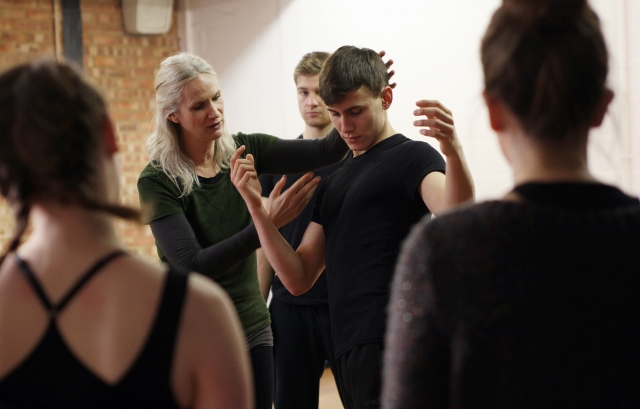Applications open on September 1. At Mountview, we close musical theatre auditions in early February and have just closed acting auditions for our three year courses. Early application is useful because we’ve already had a number of calls in the last couple of weeks from people still trying to apply but unfortunately application places are now full.
The auditions happen as part of a day of workshops – they’re not just coming for the 10 minutes in front of the panel – and recall is a half day – we keep it to two days as it gets very expensive otherwise. That’s why we increased the amount of content so the auditionees gain something from the experience and our fees are £35 – one of the cheapest in the UK.
Up to 1500 people audition for 36 places. We’re looking for people who are good actors, actors who can be trained, who are able to take direction, take notes, and are intelligent and self-reflective. So if you want to have a chance, here are my top ten pieces of advice:
1. Bring more than one piece so the audition panel has a choice. It shows the candidate is prepared and confident. If the panel has seen 15 other Juliets that morning they’ve got something else to look at. They’re looking for someone who stands out from the crowd.
2. Read as widely as possible; look beyond what you’re studying in the curriculum. If you’ve studied Top Girls, it’ll be on the curriculum so hundreds of others would have done so too. Classical doesn’t have to be Shakespeare; it could be Johnson, Webster or Marlowe. With contemporary monologues there is so much good writing now it’s good to consider what’s happening at The Bush, the Bolton Octagon so you show an awareness of new writing.
3. Make sure monologues are pertinent and right for the candidate. We ask candidates not to prepare Sarah Kane or Steven Berkoff because it’s very hard to handle and difficult for your average 18-year-old to get under the skin of. Candidates will be asked why they chose a particular piece, what they thought about the role, about the play and the performance.
4. Learn from other art forms: go to galleries. When you train you don’t just learn to act, you become a sociologist, a doctor, a psychiatrist – you have to learn so many things about the character you are going to play. Learn to be interested in whatever is out there – not just from film and TV.
5. Plan your journey and route to the audition: Make sure you know where you’re going, how long it’s going to take. It might sound obvious but take time to plan.
6. When you’re here, talk to the other candidates because you’ll learn a lot from them and their experiences. We’re looking for a company of actors, and looking for people who will get on with their peers and not just sit in the corner like prima donnas.
7. We encourage people to audition widely. You might come to Mountview and say, ‘yes I really want to come here’, or you might go to The Drama Centre and think ‘this is for me’. The audition is the most nerve-wracking thing you can do; it’s good to get as much experience as you can.
8. In the audition: you should feel physically relaxed. Don’t forget to smile. Put your phone away without a doubt and be interested in what is happening.
9. Clothes! The panel wants to see you as you are: not too much make-up if you’re a girl; not making a fashion statement; wear comfortable clothing you feel relaxed in because you will be doing movement.
10. Relax! We want to see the candidates at their best. We’re well aware we’re in competition with other drama schools. We want the candidates to do well and we want to do well too – we want them to see we’re an inclusive, engaging and caring place to study.
We don’t give feedback when we turn people down, like all other drama schools – it’s hard to unpick. We do offer short courses in summer on audition technique so you spend two weeks learning master-classing, going through the speeches and songs and trying new stuff. Those are well worth trying out before you start to audition. It’s a good option for younger candidates to start doing that earlier preparation.
Students come out with a degree from the University of East Anglia and that’s like any other degree – it’s a good piece of paper to have in whatever you want to do. We offer students 30 hours a week – that’s an awful lot of education!
For more details about Mountview Academy of Theatre Arts visit: www.mountview.org.uk




